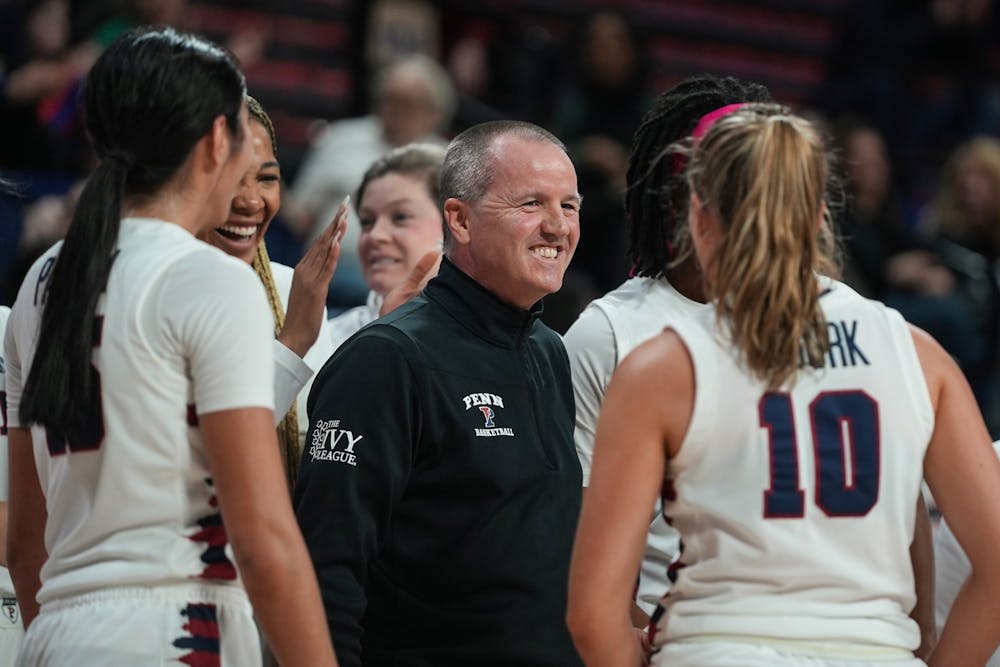
Long before Mike McLaughlin strode the sideline as head coach of Penn women’s basketball, fighting tooth and nail for every win until the final buzzer, he suited up for a much different team — one paid to lose.
At that time, McLaughlin had no idea what his basketball future held. He had no idea he would become one of the most prolific coaches in the history of NCAA basketball, or that he would one day usher Penn women’s basketball into a golden era of Ivy League contention. But he was fairly certain of one thing: no matter how hard he fought, he would walk off the court in defeat.
And yet there is nowhere he would have rather been.
Such was life for McLaughlin as a player for the Washington Generals, a basketball team best known for dutifully serving as a futile foil to the more glamorous Harlem Globetrotters. In their nearly 100 years of existence, the Globetrotters have developed into an iconic group, dazzling cities across the world with their theatrical brand of basketball. Globetrotters games are part performance, part competition. But for the latter aspect, they need someone to beat, which is where the Generals, and McLaughlin, come in.
“[It was] a competitive basketball game that had elements of entertainment,” McLaughlin said. “There were times when we had to allow them to do certain things … But you have to understand the role you’re put in.”
Those “certain things” McLaughlin is referring to are the exploits that made the Globetrotters such a captivating watch: the perilous passes, the dizzying dribbles, the dramatic dunks. By contrast, the Generals employed a more traditional style of play, but one that still sought to compete with the Globetrotters, as McLaughlin put it, “when it was not entertainment time.”

As a result, those that donned the green and yellow were elite basketball players in their own right, McLaughlin included. After four seasons at Holy Family University, where he still ranks top-ten in program history in scoring, McLaughlin was recruited by the Generals and signed a contract with the team, marking the pinnacle of his career as a player.
“I was able to play at the highest level I could, in a very professional organization,” McLaughlin said. “You’re walking into arenas and you’re playing in front of sellout crowds. I thought it was really fun.”
After spending three years with the Generals, two as team captain, McLaughlin felt it was time to move on. After debating playing professionally overseas, he ultimately chose to return to Holy Family, this time as an assistant coach for the women’s basketball team. After serving as a two-year assistant with Holy Family, McLaughlin became head coach and quickly began to assemble one of the most impressive resumes college basketball has ever seen.
In 14 seasons as head coach for the Tigers, McLaughlin racked up an astonishing 407-61 record, with his .870 winning percentage the highest of any NCAA basketball coach at any level, men’s or women’s. He was also named the Central Atlantic Collegiate Conference Coach of the Year 13 times. That success led Penn to hire him as head coach of the women’s basketball team in 2009, and the Quakers’ four Ivy League championships during his tenure speak for themselves.
But despite all his coaching success, it is his time with the Generals that McLaughlin remembers most fondly. Not only does he credit his time on “one of the most well-known teams in the world” with preparing him for the interpersonal side of being a head coach, but he says that playing with the Generals provided him with opportunities he never would have had otherwise.
“I loved it, I embraced it,” McLaughlin said. “The traveling, and seeing things I never dreamed I would have saw. I had the opportunity to not only travel, but meet some incredible people.”
Losing is never easy, especially for someone as accustomed to winning as McLaughlin. He cites “challenges” that came with adjusting to the new style, but says that the learning curve did not hold back his enjoyment.
“It didn’t come easy for anyone,” McLaughlin said. “But I adapted, and I loved it. I wouldn’t have done it for three years if I wasn’t able to adapt, enjoy it, [and] make a difference. And I felt I did all that.”
Somewhere amidst his 550 losses as a General, McLaughlin found a love unmatched by anything he had done before or since. Regardless of who won and lost, it was the joy of it all that made everything worthwhile.
“I wouldn’t trade what I did for anything,” McLaughlin said. “I thought it was the best experience of my life.”
The Daily Pennsylvanian is an independent, student-run newspaper. Please consider making a donation to support the coverage that shapes the University. Your generosity ensures a future of strong journalism at Penn.
Donate






